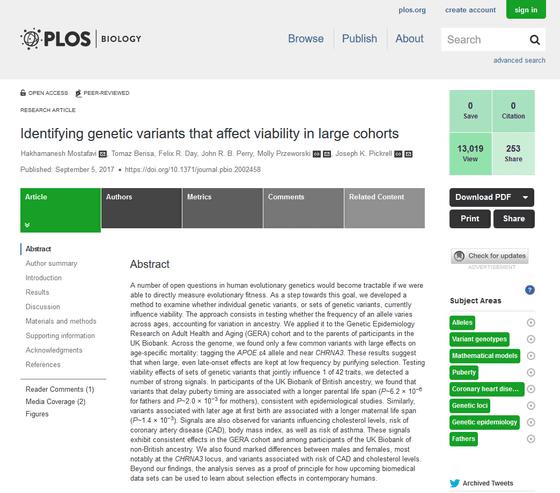It turns out that human beings continue to evolve towards extending life span

byPatrik Nygren
A large-scale survey that examines DNA of 215,000 people and tracks 8 million mutations has revealed that humans seem to be eliminating harmful genetic mutations that can shorten lifespan.
Identifying genetic variants that affect viability in large cohorts
http://journals.plos.org/plosbiology/article?id=10.1371/journal.pbio.2002458

Massive genetic study shows how humans are evolving: Nature News & amp; Comment
http://www.nature.com/news/massive-genetic-study-shows-how-humans-are-evolving-1.22565
Yes, humans are still evolving. Here's how you can tell. | Popular Science
http://www.popsci.com/humans-are-still-evolving
I did the research, evolutionary biologist at Columbia University ·Hakhamanesh MostafaviMr. and others' team, it was a few attempts to find out how human beings evolved in 1 or 2 generations.
Being "longevity" is not necessarily consistent with prospering the tribe, the important thing is to survive until adulthood, leaving as many descendants as possible. From this point of view, while it can be understood that a mutation that exerts a fatal effect while young will eventually be culled out is a natural course, it is too old to leave descendants The harmful mutations that exert their effects from then do not coincide with prosperity of the tribe and may not be subject to culling.
Mr. Mostafavi said that if a gene mutation is such a harmful one that affects survival, people with that variant will die at a higher rate than people who do not have them so much, so among the elderly population I thought that it could not be seen.
One of the things that I could see in my research was that mutants of the ApoE gene, which are thought to be strongly related to Alzheimer's disease, were hardly found in women over 70 's. Since Alzheimer's disease generally does not occur at the age of making a child, related variants have been thought not to be subject to culling, but in reality it was not. Likewise, the number of people who have genes that are thought to be prone to asthma, high cholesterol, high BMI, coronary artery disease is also decreasing, and also regarding the mutation of CHRNA 3 gene which is thought to be related to becoming a heavy smoker , I realized that those without mutants lived longer.
According to Mastafavi and others, Mr. Mastafavi thinks that these gene mutations also affect children in some way, so they are being eliminated.
Meanwhile, for long-lived people, there was also a tendency towards a change in which adolescence and childbirth are delayed. The relationship between the aging of birth dates and longevity was pointed out before, but since the effects of "wealth" and "education" were taken into account, the results of this research, which excluded such factors, As a great thing, geneticist Jonathan Pritchard says.
Related Posts:
in Note, Posted by logc_nt







